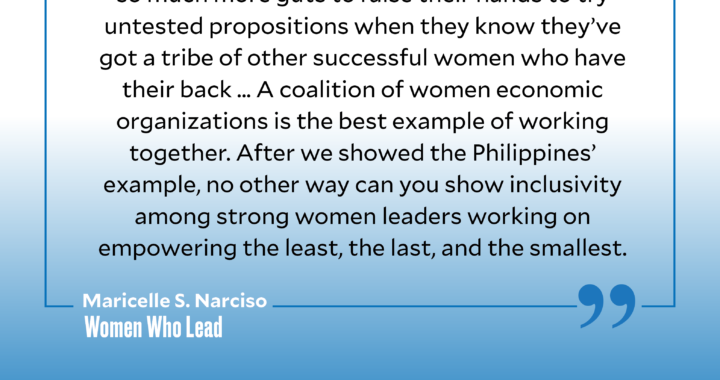I read somewhere that when women support each other, incredible things happen. And I totally relate with this because women—even amazingly powerful women—get so much more guts to raise their hands to try untested propositions when they know they’ve got a tribe of other successful women who have their back.
The Philippine Women’s Economic Network (PhilWEN) recognizes the immense power of harnessing the strengths of women economic organizations under one umbrella. As a coalition of women’s business groups in the Philippines, PhilWEN seeks to amplify the magic of women collaborating with each other to realize its shared advocacy of gender equality, diversity, and inclusion. As a network of women seeking economic empowerment for women in the workplace and in the community, PhilWEN aims to be the catalyst for its member organizations to access funding, training and upskilling, and representation in international fora to become an influential voice of Filipino women.
Today, PhilWEN has five member organizations with a common interest to positively influence the local business landscape to be a safe, inclusive, and equitable place where women can succeed. Individually, each member organization is founded on specific women-oriented economic spheres: women in the marketplace (start-ups, micro, small, medium, and large enterprises), women in the workplace (senior leaders, CEOs, and board directors) across various industries, as well as women in communities (marginalized women in urban and rural communities).
Business and Professional Women BGC welcomes women leaders in the small and medium-sized professional and business enterprises to reach their full professional and leadership potential through networking, skills-building workshops, and seminars.
Filipina CEO Circle (FCC) represents Filipina CEOs who rose from the ranks to become senior corporate leaders in professional services, investments, fashion, infrastructure, technology, health care, and manufacturing. FCC inspires its members through activities designed to fuel their professional growth, passion, and success.Network for Enterprising Women (NEW) provides a platform for aspiring women entrepreneurs to anchor their business growth through right business ethics, networking, and business workshops. It recently partnered with Miriam College to mentor students who aspire to become entrepreneurs through consultations, immersions, and learning sessions with NEW members.
NextGen Organization of Women Corporate Directors (NOWCD) is composed of women board directors advocating for good governance and gender diversity in boards of publicly listed companies and nonprofits. Its mission is to leverage strategic partnerships to increase the number of Filipino women sitting in Philippine board rooms.
SPARK! Philippines focuses on creating equal opportunities for women, especially those who are financially challenged, to boost the country’s economic growth and development. SPARK! recently partnered with the United States Embassy and the Academy for Women Entrepreneurs for training and mentorship for 350 Filipino women.
At PhilWEN, we believe our journey toward achieving our shared advocacy for women economic empowerment needs a united front. Collaborative partnerships to amplify our voice, transparent communication in safe and inclusive environments, and trust are the cornerstones to accelerating women’s economic empowerment in our country.
A perfect regional example. In 2017, we influenced and inspired our sisters from the Asean Women Entrepreneurs’ Network (AWEN) to do the same—create coalitions than work separately on the same advocacies. Thus, AWEN Thailand was formed, Cambodian Women Entrepreneurs Network in Cambodia, AWEN Malaysia, Singapore Women Entrepreneurs Network for Singapore, and the rest will soon follow suit. A coalition of women economic organizations is the best example of working together. After we showed the Philippines’ example, no other way can you show inclusivity among strong women leaders working on empowering the least, the last, and the smallest.
With over 200 members in PhilWEN, we cross ages, skills, years of experience, and a diversity no single organization may achieve. And a bigger reach is achieved with a wider net cast across different demographics. We are grateful to our PhilWEN partners who help us build bridges so every Filipino woman can thrive and be successful. Because truly, when women support each other, magic can happen.

